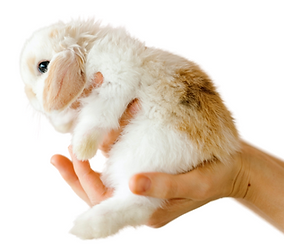.png)
Adoption
The information below will help prepare you and guide you through the reservation process.
Ready to adopt?
Our babies are popular and in high demand because of the way we hand raise, and nurture them from the day they are born. When trying to visit us, please get in contact with us. We operate a closed facility for the health and well-being of our bunnies. We will be able to provide you with pictures of our available bunnies. If you are ready to take the next step forward, please read below.
Pick up:
Your bunnies pickup date will be assigned to you by a Bunnyland305 coordinator. Again, we operate a closed facility for the health and well-being of our bunnies. All bunnies will need to be picked up in Miami Dade County. All bunnies will have a thorough, video-documented health check before leaving our rabbitry. Upon pick up, your bunny will be examined so that you may clearly see there are no signs of illness. Eyes and nose will be checked and you will have the option to check gender.
Once the bunny has left our facility we are no longer in any way responsible for the health and well-being of your bunny. There are too many unknown factors involved, refunds WILL NOT be issued in the event of your bunnies' death due to improper handling. It is your responsibility to do your research before bringing home your bunny.
When you first bring your bunny home:
Many bunnies are shy at first. Have your bunnies home ready in advance (or you can purchase one of our new home starter kits), so that you can bring the bunny home, place it in its new area, and let it get used to it for two or three days. The bunny will be under a great deal of stress with changing homes, so allow the bunny to get used to its new surroundings with as little stress as possible to avoid illness.
Before bringing the bunny home, you have to decide where he/she will live. Making your house a bunny safehouse will help to create a special bond between you and your bunny. Bunnies make terrific house pets and can be kept in a similar manner as we would keep an indoor cat. Many bunnies roam free throughout the house or have their own room. If you have other pets or small children, or when you first bring the bunny home before he/she settles into its new house, you may need to keep him/her in a cage or pen. Bunnies are much more comfortable when they live on the floor.
Many bunnies do not like when people reach into their cage to drag them out, so it’s better to open the cage door and let the bunny walk out on its own to explore. Sit down, relax and watch your bunny check out the room and you. This allows the bunny to feel secure in its new home because it knows where to run to be safe and it can approach you and meet you as it would a friend.
Allow the bunny increasing amounts of time out of its cage, under supervision. This method also encourages using the pen or cage as a place to pee and poop. It may take a few weeks for your new bunny to settle down and open up to bond with you; a calm environment and consistent behavior on your part will help your bunny adjust quickly.
It is recommended that bunnies do NOT be kept outdoors in hutches. These bunnies never receive enough attention. One bunny, living alone in an outdoor hutch, will feel like he is in jail, in solitary confinement. We don't lock our dog and cat pets in a small cage outside 24 hours a day, feeding them once a day only, and bunnies shouldn't be treated that way either.
In addition to the mental and emotional hardships, outdoor bunnies are exposed to extreme heat and cold, which may kill them. Escape from heat and sun for bunnies is important; in the wild, bunnies are active at dawn and dusk, spending the hot midday hours relaxing in cool burrows underground.
Dogs and cats commonly get into yards and can harass bunnies to death. Also, it is difficult to monitor the bunnies' health and you may one day walkout to find a weak bunny with diarrhea, maggots, hock sores, etc.; expensive problems that could easily have been avoided. If your bunny must live outdoors, give it a bunny friend and provide them with shade, a wooden hide box filled with hay for protection from the elements, ice-free water in the winter, a frozen 2-liter bottle of water to help them stay cool in the summer, and fresh food.
Make sure your bunny has a very large cage, and take it out of the cage frequently for exercise and attention. If you get a cage with a wire bottom, give the bunny something to stand on like a piece of wood, grass matt, carpet, towel, or synthetic fleece. If your bunny chews excessively on the towel or carpet, remove it to avoid an obstruction in the digestive tract.

.png)